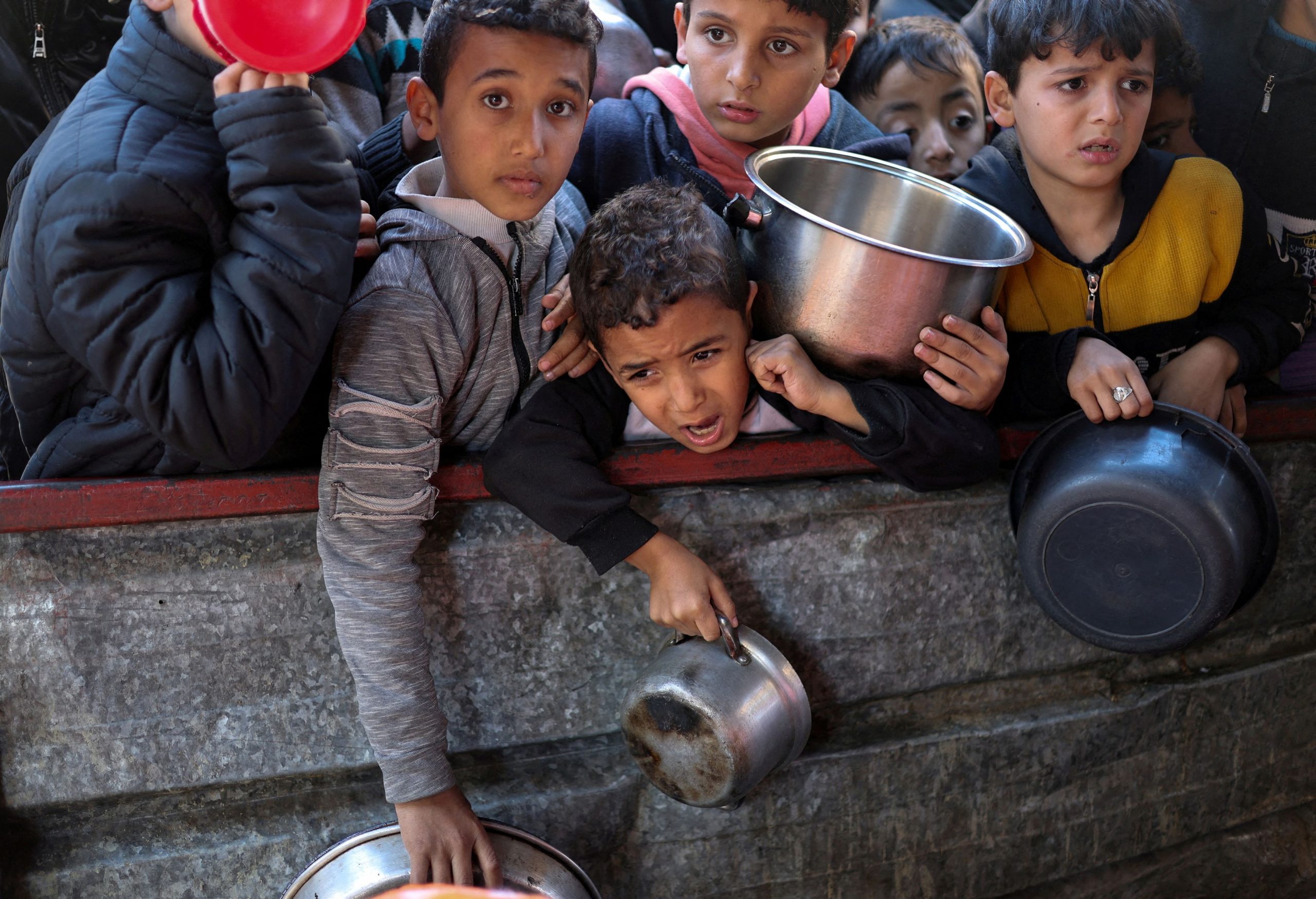WASHINGTON—Israeli Prime Minister Benjamin Netanyahu has agreed to send a team of officials to Washington to discuss U.S. concerns over its planned military operation in southern Gaza that would potentially put over a million civilians at risk , the White House said, as Israel and Hamas began a key round of talks over hostages and a cease-fire proposal.
President Biden warned Netanyahu against an offensive in the city of Rafah in a frank phone call on Monday, escalating his pressure on Israel to rethink its war strategy and insisting it could still accomplish its goal of defeating Hamas, the U.S.-designated terror group whose attack last October sparked the war .
“A major ground operation there would be a mistake, it would lead to more innocent civilian deaths, worsen the already dire humanitarian crisis, deepen the anarchy in Gaza, and further isolate Israel internationally,” national security adviser Jake Sullivan said, describing Biden’s message to Netanyahu.
“More importantly, the key goals Israel wants to achieve in Rafah can be done by other means,” Sullivan added, not specifying further.
The White House salvo underscored Biden’s deep disagreements with Netanyahu —and the administration’s willingness to air the differences publicly, in hopes of swaying Israel and as a response to domestic critics who say Biden hasn’t done enough to rein in Netanyahu.
It comes after other recent steps by Biden and his allies to pressure Netanyahu’s government to increase the flow of humanitarian aid into Gaza as signs of widespread hunger mount and to sign on to a U.S. postwar plan that includes a new diplomatic push for an independent Palestinian state.
Biden earlier this month declared that he might withhold U.S. weapons deliveries unless Israel takes steps to protect civilians in Rafah. But Sullivan said that the president had not made threats to Netanyahu on Monday.
“What the president said today was, ‘I want you Mr. Prime Minister, to understand exactly where I am on this. You need a strategy that works…There is a better way,’” Sullivan said.
As an example of the flaws in Israel’s strategy, Sullivan cited its military raid on the Al-Shifa Hospital in northern Gaza early Monday, which Israeli troops first cleared of Hamas operatives months ago before withdrawing. But Hamas operatives returned to the hospital, requiring another Israeli operation.
“Israel cleared Shifa once and Hamas came back into Shifa, which raises questions about how to ensure a sustainable campaign against Hamas, so that it cannot regenerate, cannot retake territory,” Sullivan said.
Netanyahu’s office said that the two leaders discussed developments in the war, including Israel’s objective of eliminating Hamas, freeing the remaining hostages, humanitarian aid and “ensuring that Gaza never constitutes a threat to Israel.” It didn’t mention Israel’s commitment to send an interagency delegation. Israel didn’t respond to a request for comment.
Biden told Netanyahu there needed to be an “immediate ceasefire” lasting several weeks, to free hostages held by Hamas and permit more aid into Gaza, the president said in a post on X, the social-media site formerly named Twitter.
Netanyahu has argued that Hamas militants have burrowed themselves among the civilian population in Rafah and has vowed to proceed with invasion plans, in defiance of the growing international outcry over the soaring civilian death toll and concerns over the potential for famine.
Sullivan said the large numbers of people who have taken refuge in Rafah, have “nowhere else to go,” adding that most major cities in Gaza have “largely been destroyed.” An Israeli military operation would disrupt aid deliveries, given that Rafah is a major entry point for supplies coming via Egypt, which borders Gaza, he added. Finally, he said, Egypt has voiced “deep alarm” over any impending operation and has raised questions about its future relationship with Israel if a military operation were to take place.
The talks between U.S. and Israeli officials on Rafah are expected to be later this week or early next week.
Sullivan said that Hamas’s third-ranking operative, Marwan Issa, was killed in an Israeli operation last week, the highest-ranking Hamas official yet killed. Israel’s military has declined to comment on Issa’s status.
Meanwhile, Israel and Hamas began a key round of ceasefire talks in Qatar on Monday.
An Israeli delegation led by intelligence agency Mossad’s chief, David Barnea, landed in Qatar, where the mediators—from the U.S., Egypt and Qatar—were expected to hold intense negotiations for as long as two weeks because of large gaps in their positions, an Israeli official said.
The framework for a deal is around six weeks of cease-fire for some 40 hostages, according to the Israeli official. Key sticking points for Israel are Hamas’s demand that Israel allow Gazans to return to the north of the enclave, as well as control over which Palestinian prisoners will be released as part of the deal.
Israel returns to Al-Shifa
The raid on Al-Shifa Hospital occurred after “concrete intelligence that demanded immediate action,” according to military spokesman Daniel Hagari. The Israeli military said it took control of a part of Al-Shifa after a five-hour battle, apprehended about 80 people, and killed a Hamas commander. One Israeli soldier was also killed.
Hagari said that senior Hamas militants had re-entered the hospital and were using it to direct attacks against Israel. Israel released a video that it said showed its troops coming under fire from militants at the complex. The Israeli military urged people present in and around the hospital to leave. Palestinian health officials said the raid threatened the lives of patients and thousands of displaced people at the hospital.
Israel at the peak of its military operations had about 10 brigades in northern Gaza, a figure now reduced to two brigades, said retired Israeli Maj. Gen. Giora Eiland. The drawback in forces, Eiland said, has enabled militants to trickle back into areas previously cleared by Israel. “This is more or less what happened in the Shifa hospital,” he said.
If senior Hamas operatives have returned to the area around Al-Shifa, that throws into question the level of control the Israeli military has over the northern part of Gaza, said Mouin Rabbani, a nonresident fellow at the Center for Conflict and Humanitarian Studies, an independent research center based in Qatar. Israel’s military said it had previously destroyed militant infrastructure at and around Al-Shifa, which should have prevented the re-emergence of senior Hamas militants, he said.
“The claim is not that there were a bunch of cadres with light weapons—they are claiming that there are senior Hamas militants there,” Rabbani said. “That’s inconsistent with previous assertions that the military has been able to crack the movement in the northern Gaza Strip, and that senior leaders either fled south or were eliminated.”
Footage shared by the Ministry of Health in Gaza showed smoke rising around the hospital, with the sound of gunfire and aircraft buzzing overhead. Health officials said Israeli military vehicles were around the complex where they said a fire broke out and that several deaths and injuries occurred.
“We don’t know how to move around without the risk of being hit,” Amr Fawzi, a vascular surgeon at Al-Shifa, said in an interview as he sheltered in the hospital. He added that Israeli military bulldozers destroyed parts of the complex used by ambulances.
Ahmed Almaqadma, a plastic surgeon at Al-Shifa, said only a few doctors remained at the hospital and nurses in recent months have mostly been volunteers rotating through. Almaqadma estimated that thousands of displaced people and hundreds of patients are still on Al-Shifa’s campus.
Within the hospital, the Israeli military detained Al Jazeera correspondent Ismail Alghoul as he performed his journalistic duties, the network said. The reporter was beaten and taken to an unknown location, said Al Jazeera, citing what it said were witnesses, while camera equipment was destroyed. The Israeli military didn’t respond to a request for comment. The Committee to Protect Journalists said it was alarmed by the report and called for Alghoul’s release.
The Ministry of Health in Gaza called on the United Nations to protect the hospital. World Health Organization Director-General Tedros Adhanom Ghebreyesus said in a social-media post that hospitals should never be battlegrounds.
“Any hostilities or militarization of the facility jeopardize health services, access for ambulances, and delivery of lifesaving supplies,” he said. “Hospitals must be protected. Ceasefire!”
Hospitals are protected under international law, but they can lose their special status when they are actively being used for hostile acts toward the enemy. Hamas said its forces were engaged in clashes with Israeli forces near Al-Shifa Hospital, and that they targeted Israeli military vehicles. Hamas released a statement calling the Israeli military operation “a new crime.”
Al-Shifa Hospital was at the center of contention between the Israeli military and Hamas in November. The military alleged that Hamas was operating a command and control center from Al-Shifa. While many security analysts had agreed that there was evidence released by the Israeli military of a Hamas armed presence at the hospital, most said they had not seen something that constitutes a smoking gun showing it was a major command center. The hospital’s director, Mohamed Abu Salmiya, has been missing since he was detained by Israeli forces in November, according to former and current Al-Shifa staff.
Those operations late last year effectively knocked the hospital out of service for a period and led to the evacuation of patients and displaced people. The hospital slowly restored some services in the weeks following the Israeli military’s withdrawal, with the facility being used to treat scores of Palestinians injured in a deadly aid convoy incident last month.
Previous Israeli military raids into Al-Shifa took hours to build up. This time, it happened in a matter of minutes, said Fawzi, the surgeon, who says he has worked at Al-Shifa throughout the war.
The Israeli military said that past operations within the hospital complex were geared toward uprooting militant infrastructure, whereas Monday’s raid was focused on targeting militants.
Write to Vivian Salama at vivian.salama@wsj.com , Omar Abdel-Baqui at omar.abdel-baqui@wsj.com and Summer Said at summer.said@wsj.com



